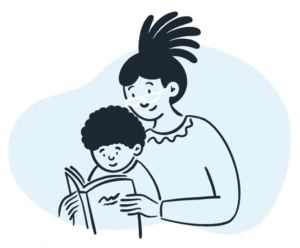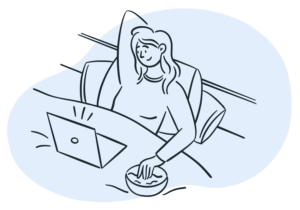How Sleep Deprivation Affects Parenting
Disclosure: By clicking on the product links in this article, Mattress Nerd may receive a commission fee at no cost to you, the reader. Read full disclosure statement.
There are scores of books and journal articles that stress the importance of good sleep for a child’s optimal physical, cognitive, and mental development. Comparatively, the issue of parental sleep has been largely ignored. Yet, sleep deprivation is a common part of parenting, especially during the first few weeks with a newborn but even as a child progresses into a teenager.
While it is normal for parents to experience sleep loss from time to time, it can be a serious problem if sleep deprivation becomes chronic.
“Adults age 18 and older function most efficiently and effectively with somewhere between 7-9 hours of sleep per day,” says Dr. Kent Smith, with Sleep Dallas. “However, studies show that new parents get less than five hours of sleep on an average night during the first year of their baby’s life. This is concerning because a night of bad sleep—even in the short term—can have [negative] effects on a person’s body and mind.”

How does your sleep affect you and your child?
Good sleep helps babies’ bodies and minds develop healthfully. But parents need to be well rested in order to be the best parents they can be.
When we are deprived of sleep, our mental and physical health suffer. We are at greater risk for obesity, diabetes, cardiovascular disease, and early death. We are also more prone to depression, anxiety, and irritability, as well as accidents, such as car crashes and falls, according to the National Heart, Lung, and Blood Institute. Insufficient sleep can also negatively impact parenting. Overtired moms and dads are more apt to overreact to stressors and make thoughtful parenting decisions.
According to a study published in the Journal of Family Psychology, mothers who were sleep deprived experienced greater stress, which further interfered with their ability to fall asleep and stay asleep at night. It also had an adverse impact on their ability to parent.
Mothers of infants with sleep problems are also at greater risk for postpartum depression, which can also affect the care they give to their babies. Studies show that depressed mothers are more likely to report behavioral issues with their babies, such as eating problems, sleeping issues, temper tantrums, and separation anxiety.
“There is a relationship between frequent lack of sleep and mental illnesses like depression and anxiety,” says Megan Ayala, a nutrition, fitness and health expert at Patricia and Carolyn. “Tired parents easily get irritable and frustrated because of this.”
Sleep problems can also negatively impact relationships. According to a study published in the journal Sleep, a person’s sleep problems can cause their partner to feel less happy and satisfied in their marriage.
What can help parents get better sleep?
Establish a nighttime routine: Creating a bedtime routine not only helps kids settle down for bedtime, they also help adults wind down as well. “The routine sets us up for healthier, more restorative sleep,” says Bella Luna Family blogger Cristine Brown. An hour or so before bedtime, after the kids have gone to bed, adopt some relaxing practices such as:
- Unplugging from electronic devices. Laptops, tablets, and smartphones emit blue light. “The blue light emitted by devices shuts off our sleepy hormone (melatonin) production and makes it harder to fall asleep and decreases sleep quality,” Brown says.
- Crack open a book instead. Reading requires your brain to concentrate and your eyes muscles to follow the words on the page, both of which can cause your eyelids to get droopy and lull you to sleep.
- Meditation is a great way to quiet the mind and relieve tension, which can help you sleep better.
- Take a warm bath or shower. Showering yourself with warm water causes a drop in body temperature, which aids the circadian process and helps invite sleep.
Share bedtime responsibilities with your partner or family member. Putting baby to bed can be stressful, especially if the little ones keep pestering for one more night time story. Plan with your partner to trade off bedtime responsibilities, especially when one of you is particularly exhausted or stressed. “Don’t be afraid to ask for help. Is there a grandparent or trusted friend who is willing to lend a hand with your child? If so, let them! Have them look after the baby for a few hours while you grab some shut-eye,” Dr. Smith says.
Practice self-care. People tend to think self-care is selfish, but it is quite the opposite. Taking time for yourself keeps you well rested so that you can care for your little ones. Some ways to practice self-care include:
- Taking a walk in nature.
- Getting a massage or pedicure.
- Exercising or going to the gym.
- Getting away for some alone time.

Create a comfortable sleep environment. Your bedroom should be a sanctuary reserved only for sleep and sex. Some ways to improve your sleep space include:
- Investing in a new mattress. A comfortable and supportive mattress can do wonders for your sleep.
- Setting the thermostat to a little cooler at night than during the day. Dr. Smith suggests setting it between 60 and 67 degrees.
- Use blackout blinds or drapes to block out unwanted light, or wear a sleep mask.
- Play white noise to block out any unwanted noise such as outside traffic or a neighbor’s noisy TV.
- Dress your bed in light, crisp linens that keep you cool and dry throughout the night.
Seek therapy. If you have been unable to get adequate sleep despite making efforts to do so, you may benefit from talking with a therapist. Counseling can help you get to the root of the stressors in your life and help you find more effective ways of coping.
Stay active. “Walking to the park or taking a family bike ride can reduce stress and anxiety, and can help relieve sleep difficulties,” Dr. Smith says.
But don’t exercise too close to bedtime. “Be careful about strenuous exercise too close to sleep, though, as it can hinder your ability to fall asleep,” he says. “Be sure to give yourself enough time to relax between your workout and bedtime.”

Final Thoughts
Sleep is an important part of a child’s health and development, but it’s just as important for parents’ wellbeing. Well rested moms and dads are not only better equipped to handle the ups and downs of parenting, they’re also less stressed, easier to get along with, and generally happier. If you are having trouble getting the sleep you need, try improving your sleep hygiene, or consider talking to a therapist to better deal with the stressors in your life.
If parents “prioritize their own sleep,” Brown says, “it will make all aspects of life easier and enjoyable.”


